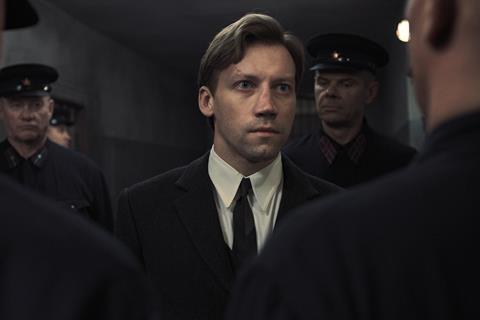The Ukranian writer/director’s Kafka-esque film is based on a story by author and gulag prisoner Georgy Demidov

Dir. Sergei Loznitsa. France/Germany/Netherlands/Latvia/Romania/Lithuania. 2025. 102mins
The closed-trap logic of Soviet justice under Stalin is demonstrated with characteristically chilly rigour in Two Prosecutors, the first fiction film in seven years by Ukrainian writer/director Sergei Loznitsa. Very much of a piece with his earlier fictions, notably 2017’s A Gentle Creature, the film also explores the same aspects of Soviet history as some of Loznitsa’s recent archive documentaries; notably 2018’s The Trial, about the Stalin-era show trials. Based on a long-unpublished story by Georgy Demidov, himself a long-term prisoner in the Soviet gulags, Two Prosecutors is crisply fable-like in construction. An impressive addition to the director’s always insightful work, the film has sold to multiple territories ahead of its Cannes Competition premiere and should command serious attention elsewhere.
An impressive addition to the director’s always insightful oeuvre
A grim, spare prelude is set in a provincial Soviet Union prison in 1937, at the height of Stalin’s Terror. An aged prisoner is given the job of burning a sackful of letters from convicts pleading with Stalin to reconsider their cases. Among these doomed missives is a note written in blood by one Stepniak (Alexander Filippenko), requesting a visit from the state prosecutor. We can’t help wonder how it found its way into the for-burning pile, and so the drama’s irrevocable logic is set in play from the first.
A prosecutor does answer Stepniak’s call. He is the young, newly appointed Kornyev (a quietly commanding performance from Aleksandr Kuznetsov, whose credits include Kirill Serebrennikov’s Leto). He requests to see Stepniak but is initially obstructed by the prison governor, who warns him that Stepniak has a contagious illness. As we soon realise, that disease is nothing more or less than a clear-eyed knowledge of the truth, which, once contracted, is bound to be deadly.
Stepniak, infirm and carrying the marks of a lifetime’s suffering, is himself a former prosecutor. He shows Kornyev his horrific wounds and tells him that he is one of countless innocent, faithful Soviet citizens who have had false confessions beaten out of them. These abuses, says Stepniak, are the work of saboteurs within the secret police, the NKVD, determined to undermine Soviet society. Inspired by his story, Kornyev determines to reveal the truth to higher authorities. He takes a train to Moscow, en route hearing the narrative of a war veteran (Filippenko again), whose story of an audience with Lenin is an illustration of plus ça change that ought to be a warning for the well-intentioned young man.
The film’s Kafkaesque dimension now deepens as Kornyev explores a Party office in Moscow, where he is congratulated on his success by an ominously jovial fellow who claims to know him. He is eventually granted an audience with Vishinsky (Anatoly Beliy), the state prosecutor who was a major figure in the 1930s show trials – as soon as we hear his name, we know that Kornyev’s card is marked.
Loznista’s script displays a level of explicitness that, at moments, arguably undermines the film’s effectiveness as drama – notably when Stepniak lucidly, but speaking from ironically partial understanding, spells out the nature of the system. But that explicitness, even if a touch leaden in this long-take scene, is nevertheless given galvanising force by Filippenko’s basilisk-like performance – and the information he imparts pays off as we come to measure Kornyev’s new knowledge, and his enduring faith in Soviet ideology, against his tragic innocence.
Kornyev’s progress underlies what is very much a companion piece to A Gentle Creature, whose heroine negotiated the prison system in a more modern Russia not entirely different from Stalin’s. In terms of tone, the film’s austerity is – despite chilling touches of absurdism – a universe away from the grotesqueries glimpsed in that film, or those to which Loznista gave full rein in his bleakly satirical war film Donbass. With locations including a prison in Riga, the film evokes a world that is pitilessly claustophobic both inside and beyond the prison world, with the production design and Oleg Mutu’s Academy ratio photography giving the period realism a distinct edge of knowingly theatrical stylisation.
Production companies: SBS Productions
International sales: Coproduction Office, sales@coproductionoffice.eu / US & UK Sales: SBS International, contact@sbs-distribution.fr
Producer: Kevin Chneiweiss
Screenplay: Sergei Loznitsa, based on a story by Georgy Demidov
Cinematography: Oleg Mutu
Production design: Jurij Grigorovic, Aldis Meinerts
Editor: Danielius Kokanauskis
Music: Christiaan Verbeek
Main cast: Aleksandr Kuznetsov, Alexander Filippenko, Anatoli Beliy, Andris Keiss
























